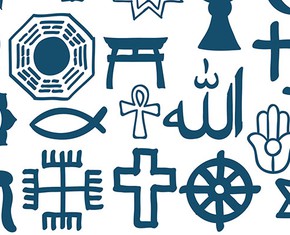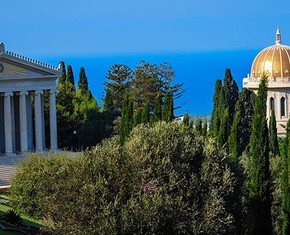The views expressed in our content reflect individual perspectives and do not represent the authoritative views of the Baha'i Faith.
What happens when the prophet and founder of a new faith ascends to the realm of the spirit?
This third stage in the huri of love means that the divine messengers or manifestations continue to function as spiritual intermediaries after their passing. In this station, no longer constrained by the dramaturgy of limited humanness, the prophets, messengers, or manifestations oversee and assist the process their revelations have set in motion. In this station they are fully able to assist us individually and collectively as we attempt to understand and implement the divine plan revealed to us by their revelation.
RELATED: What Comes After Life? There is More to Us Than We Can Ever Know
Baha’u’llah alluded to the wisdom and power of this third condition with the following well-known verse from his “Most Holy Book”:
In My presence amongst you there is a wisdom, and in My absence there is yet another, inscrutable to all but God, the Incomparable, the All-Knowing. Verily, We behold you from Our realm of glory, and shall aid whosoever will arise for the triumph of Our Cause with the hosts of the Concourse on high and a company of Our favoured angels.
While this wisdom is inscrutable — another huri, if you will — Shoghi Effendi in “God Passes By” alludes to part of the wisdom in this third condition with wonderful clarity:
… the dissolution of the tabernacle wherein the soul of the Manifestation of God had chosen temporarily to abide signalized its release from the restrictions which an earthly life had, of necessity, imposed upon it. Its influence no longer circumscribed by any physical limitations, its radiance no longer beclouded by its human temple, that soul could henceforth energize the whole world to a degree unapproached at any stage in the course of its existence on this planet.
Another aspect of this third stage that is particularly relevant to our own third stage of existence—the first two being the world of the womb and the world of physical experience—has to do with the fact that the indirect relationship with God by means of the manifestation as intermediary persists throughout our existence into the realm of our post-carnate state of existence. Shoghi Effendi, in a letter from his secretary to an individual Baha’i, explains:
We will have experience of God’s spirit through His Prophets in the next world, but God is too great for us to know without this Intermediary. The Prophets know God, but how is more than our human minds can grasp.
An important aspect of the station of the prophets, pertaining to all three stages of their reality, but, for us, most particularly, to the second and third stages, is the fact that the manifestation ever remains for us the most complete understanding of the Creator we will ever attain.
Therefore, as Baha’u’llah explains at length in “The Book of Certitude”, the concept of gaining access or proximity to God — of entering the “presence” of God — is a figurative and spiritual one, not a literal fact. In other words, God will ever remain “essentially” unknowable, and all our knowledge of God will ever be acquired through the intermediary of the manifestation, whether in this life or in the afterlife. Baha’u’llah writes:
He Who is everlastingly hidden from the eyes of men can never be known except through His Manifestation, and His Manifestation can adduce no greater proof of the truth of His Mission than the proof of His own Person.
The source of all learning is the knowledge of God, exalted be His Glory, and this cannot be attained save through the knowledge of His Divine Manifestation.
RELATED: Who Speaks for the Creator?
Yet another extremely significant feature of the distinct ontology of the prophets and messengers as intermediaries is that when they describe their authority as being derived from God, it is totally clear in the Baha’i teachings that the specific channeling of this command or Primal Will into specific ideas, appropriate language, and social design derives from the willpower and creativity of the manifestations themselves. True, They repeatedly acknowledge that all that they do and say derives from God working through them, and in the sense that it is the will or wish of God to bring about a creation capable of knowing and worshiping Him, this is precisely accurate.
But it is equally clear from several passages throughout the Baha’i writings that the specific design of the dispensation wrought by the manifestation in his station of “distinction” — that is, as a prophet appearing at a particular time in particular circumstances in which there are specific needs and specific capacities — the manifestation is the fashioner of his own revelation.
For example, Shoghi Effendi states that the “Most Holy Book” “may well be regarded as the brightest emanation of the mind of Baha’u’llah, as the Mother Book of His Dispensation, and the Charter of His New World Order” (italics added). Likewise, in another passage, Shoghi Effendi praises the world order that Baha’u’llah has devised as the product of Baha’u’llah’s own creative and willful genius. This extended metaphor, itself a marvelous work of the Guardian’s own creative genius, states this capacity in remarkably effective terms explained in Shoghi Effendi’s “The Promised Day is Come”:
Not ours, the living witnesses of the all-subduing potency of His Faith, to question, for a moment, and however dark the misery that enshrouds the world, the ability of Baha’u’llah to forge, with the hammer of His Will, and through the fire of tribulation, upon the anvil of this travailing age, and in the particular shape His mind has envisioned, these scattered and mutually destructive fragments into which a perverse world has fallen, into one single unit, solid and indivisible, able to execute His design for the children of men.
Put simply, the manifestation is not merely God’s mouthpiece or amanuensis. The prophets and messengers of God represent the creative force that translates the Creator’s wish, will, and desire into increments of creative revelation, action, and design, appropriate to what each manifestation sees as propitious for a given period in human evolution on our planet.
















Comments
Sign in or create an account
Continue with Googleor